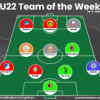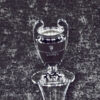
As with almost every other rivalry in football, in fact in any sport, there is a heady mixture of geographic, social, and sporting history that defines a fixture. Aakriti Mehrotra writes about the rivalry that Marseille and PSG share- Le Classique
As far as football rivalries go, Paris Saint-Germain vs. Olympique de Marseille, popularly known as “Le Classique” (earlier it was known as Le Classico) is a relatively new one. This is because PSG was only founded in 1970 and for a long time, there weren’t many teams that could match French football giants, Marseille who were formed in 1899, 71 years before the Parisians were existent.
Till then, Marseille’s competitors for trophies were Saint-Etienne and Bordeaux. The games were full of fire and brought with them tremendous excitement and hype. However, the prospect of a North versus South derby was too enticing, especially considering the two cities already shared a grand enmity in other spheres. Even so, on the football field, it took time even after PSG was founded for Marseille’s trips to the capital to become exhilarating. Once PSG claimed their first title under the reigns of Gerard Houllier in 1986, the potential for a serious rivalry finally came to fore.

Marseille didn’t take too fondly to their Parisian compatriots coming up in football. In France, everything was so centralised around the capital, football was one thing the people of Marseille or Marseilles could dominate on their own and took a lot of pride in. When TV company Canal + took over the Parisian outfit, to create more competition in the league and of course, increase their TV figures, the football enmity also became more intense.
Understanding the reason for the hostility between the two cities that had existed for long can explain to us, the football rivalry as well. Some of the postcards available in the archives of a beautiful, but sadly inactive blog called The Parisian Fields can best illustrate this.
A postcard with the image of “Pont transbordeur de Marseille”, the famous bridge of Marseille built in 1904, but destroyed in 1944 during World War 2 when the German military blew it up to block the port during the liberation of Marseille, carries a hymn in praise to the bridge and a reminder of how big the sardines are in Marseilles. People from Marseille proudly talk about their history and the message of pride is implied through these souvenirs. So what if they don’t have the Eiffel Tower? They have huge sardine fishes, and unlike Paris, who claims to see itself as an important port, theirs is an “actual” port, with more than water and boats, because their port has fish. Parisians laugh this off by claiming they don’t need to beat the fish with their hands when they want some, they simply must throw a bucket in water, and they will get fish! Things come easy for Parisians.
Understanding the rivalry between fans and the players on the pitch is easier when we take into account the very genuine cultural divide between two great cities north and south of France and issues of class, economies, politics and society that play a massive part in why these two clubs hate each other so much.
On the one hand is a city that contributes to a third of France’s GDP and 5% to the European Union’s – it is France’s capital for a reason. On the other, is the gritty French port which has the clichéd maladies that encompass the working class – poverty, gang wars, declining industry and rampant unemployment. Unlike most big cities, including Paris, the poor live in the centre of the city, but the city is not just filled with the poor – the middle class exists and co-exists in cohesion, unlike Paris. In the capital, there is little social interaction between different classes due to manmade barriers like the surrounding motorway. What unites everyone in Marseille is the patchwork of the poor and better-off, bound together by the sea and the football. When Paris decided to take their pride of playing the best football away from them with the help of a lot of money, folks from the city once conquered by Julius Caesar didn’t take too kindly to it.
If Canal + were hugely responsible for this rivalry, socialist politician Bernard Tapie (an advisor to French president Francois Mitterand and notably someone who led a campaign against far-right politician Jean-Marie Le Pen), becoming president of Olympique de Marseille made matters equally intensified. Long before Donald Trump’s Apprentice, Tapie hosted a prime-time television show called “Ambition” that helped young entrepreneurs realise their dreams and set up their businesses.
Tapie hated PSG and their easy route to the title. His political ideology showcased his belief for working hard to achieve things. PSG was the nouveau riche. People of Marseille revered him. His mantra of ‘Rêve, Risque et Rire’ (Dream, Risk and Laughter) buttressed a sentiment of virility and machismo which struck a chord with the OM faithful. This was exhibited in his provocative approach to referees, politicians and other clubs. He effectively became the leading figure of his adopted community. He wanted to return the mighty Marseille to its former glories at a time when the city was struggling both economically and importantly on the football field. It is worth noting that since he departed in a reprehensible fashion, Olympique de Marseille has failed to re-establish its ascendency and pre-eminence in European football.
If talking and dressing like a Marseille fan wasn’t enough, his hate for PSG surely sealed his status as a statue of reverence. Funnily enough, Bernard Tapie was a Parisian.
During his tenure at Marseille, Tapie hyped up the classico whenever it occurred. He went on television shows, did radio broadcasts, spoke up about his team and players at the time have revealed he went to the dressing rooms before the crucial game and encourage them to beat their bitter enemies. He truly turned the game into a massive spectacle for which everyone tuned in. His comments did result in Marseille having the most successful spell in their history as they won five successive French titles between 1989 and 1993 and reached two European Cup finals. In the second European Cup final, they beat AC Milan to become the first and only French team to lift the European Cup. Ecstasy turned to agony when Tapie was found guilty of match fixing and sentenced to seven months in jail. Importantly, Olympique de Marseille couldn’t defend their European title and had to play in the second tier, Ligue 2, in the subsequent season. Their biggest triumph turned into their biggest stain. For every other fan and club, particularly PSG, Marseille were now the laughing stock in their country that deserved no respect.
Tapie’s comments and the club’s victories also heightened tension between the two sets of fans and hooliganism became more prevalent. There were regular scuffles in the stands, in parking lots and on the streets.
The “ultra” culture of Marseille is well documented. It didn’t come as a surprise to most when most of the violence of Euro 2016 between the English and the Russians occurred in Marseille. Their most intimidating ultras in the city are the Marseille Trop Puissant (Marseille, all powerful). There are numerous other groups as well, and most take a left-wing stance, which can be attributed to the cultural background, which adds another factor to the rivalry with PSG, who stand on the opposite end of the political ideology.
Since the European Cup win, matches between the two sides have regularly featured erratic violence. Two decades back, it was absolutely awful with scores of casualties occurring every now and then, and matters have not completely simmered down even now. In an attempt to create popular fervour, the PSG owners dubbed one end of the stadium of Parc de Princes “Kop de Boulogne” or “Boulogne end” and offered cut-price tickets. It worked, but among the fans that came to enjoy the discounts, contained a sizeable fascist contingent, and people without similar far-right sympathies weren’t keen on being a part. The “kobistes” expressed their feelings in songs, banners and hooliganism against not only the supporters of Marseille and other rivals but other fans of PSG as well. Instead of removing these fans, the club rather foolishly decided to attract the “others” to the opposite end of the ground, the Auteuil stand. Other more multi-cultural and inclusive supporter groups of PSG also came up to antagonise the Boulogne, but it only established the latter as a “white only” group/stand. In stark contrast to most PSG fans – fiercely nationalistic and patriotic, Marseille’s population is made up of Spanish, Italian and North African immigrants, and football manages to bring the multi-racial city together.
In 2010, in an unprecedented move, the French government announced the dissolution of seven fans’ groups that included five of PSG’s. This came due to events preceding a Le Classique when rival PSG fans engaged in clashes that led to the death of a Kobsite, Yann Lorence. It was the first time a supporter was killed by a fellow fan of the same club. There were calls for PSG to be dissolved as an example for the rest of the country. When the matter was hot, rumours arose of a new club coming up in Paris post the dissolution of PSG. Who would be the mastermind behind this new Paris Club? Paris-born Bernard Tapie.
Key games down the years
May 1989: With three days remaining until the end of the season, the clash at the Velodrome, would fundamentally decide who the title was going to. Despite what was at stake and perhaps because of it, it was a horrible match to watch with PSG defending in numbers. The first Parisian shot of the game came in the 71st minute. Just when it seemed like the visitors would be winning the trophy, with the match at 0-0 till the dying embers of the game, a long-range stunner from Franck Sauzee with barely seconds left on the clock gave Marseille all the points and led them to win their first title since 1972.
December 1992: In the build-up to the game, PSG’s new coach Artur Jorge foolishly announced to the press that his PSG side would “walk all over” Marseille. PSG’s charming forward David Ginola also promised the bitter opponents “war”. President Tapie wasn’t having any of it and to motivate the players; he stuck the clipping of the newspaper in the Marseille dressing room. In hindsight, perhaps he did a lot more to ensure his team overcome their rivals. It was one of the dirtiest matches played in the history of French football. There could have been five red cards shown to players, and there are believed to be 55 mistakes, including 33 in the first half. Michel Girard, the referee on the day, doesn’t have good memories of the game and said he had questioned his decisions from the night. Marseille’s 1-0 win on the night that was significantly aided by some questionable refereeing that still haunts Girard, and helped Tapie’s team win the league that season. PSG-Marseille matches may have had their shares of moments before this, but this was the game that truly made the rivalry what is is.
May 1999: Marseille were on their way to winning the title as they geared up to face PSG in the third last game of the season in Paris. The side had put some pressure on itself by drawing the previous game to Lyon 0-0 so when Florian Maurice scored for the visitors in the 21st minute, the visitors heaved a sigh of relief, especially since at the same time, Bordeaux were drawing 2-2 against Lens. For the rest of the game, Marseille looked very comfortable. The Marseille team was left shell-shocked when Paris Saint-Germain struck twice in the final six minutes to come back from behind to win the game on home territory. At the same time, Bordeaux managed to get a lead against Lens and won the game 3-2. Despite Marseille bouncing back to win their two subsequent games, they lost the title to Bordeaux by a single point. Parisians were instrumental in their title loss, something they never let Marseille forget.
Important Figures
Éric Di Meco: The left-back played over 200 matches for Marseille and spent most his career in France’s second city. He won five league titles and a Champions League title with the club. He remains a huge fan favourite, which is due to his performances on the pitch and the commitment he shows, especially exceptional against their Parisian rivals.
Pauleta: PSG’s legendary striker Pauleta scored in six games against Marseille in 5 seasons. During his time at the capital club, PSG managed to go a series of eight straight victories against Marseille, an incredible achievement, especially considering Marseille were often in a better position in the league than PSG.
Didier Drogba: In 2003, Drogba arrived from Guingamp, and endeared himself to OM supporters for life. He scored 32 goals for the side in all competitions in his first and only season. But his on-field exploits were not the sole reason for his popularity. He appreciated the maritime city’s culture and took part in local practices. He departed for greener pastures to Chelsea, and in his first game for Chelsea, Drogba scored twice against PSG and went celebrating in front of the Boulogne stand at the Parc de Princes. He chanted ‘Allez l’OM Allez l’OM’, to rub into their wounds. In just one season, Drogba became a favourite son of the city.
The rivalry today
Three decades back, the PSG and OM players couldn’t stand each other’s presence and when called up to play for France, struggled to get along on and off the pitch. Since the Qatari takeover at Paris, the passion in what is supposed to be a “classic” match has mostly died out. The atmosphere around the Parc des Princes before a North versus South derby is almost not worth mentioning. There is no reason for the supporters to get passionate because PSG has maintained an embarrassing hegemony in France, and the expertise they have demonstrated while winning the four consecutive league titles since 2012-13 can illustrate that. Every season, a new competitor springs up, but PSG still manages to make the finishing line with ease. Under Marcelo Bielsa, Marseille managed to come very close to winning the title and the two classicos that season were filled with fervour. However, PSG managed to stay consistent and eventually won the title with eight points. Monaco’s form this season is encouraging and crucial for the league, but it is very important for them to maintain it right until the end as PSG are breathing down their backs, ready to jump ahead as soon as Monaco make a slip.
In the book “OM-PSG, PSG-OM les meilleurs ennemis”, published in 2003, the very controversial Bernard Tapie claims that the major reason for creating the rivalry with PSG was because he wanted a domestic rival capable of keeping his championship-winning team on their toes. The book goes on explain other reasons and the factors that further nurtured the rivalry, notably Canal Plus and the French Media. Tapie’s claims are incredibly poignant in today’s context of French football, with the position of the two French giant clubs reversed. Just like Marseille a few decades back, PSG currently require domestic rival capable of keeping them on their toes, not just to have a competitive French league, but also for a supposed “classic” game to become remotely relevant again.
Read all other articles from our Rivals series here.
References:
Friends and Foes Volume II: Friendship and Conflict from Social and Political Perspectives – Graeme Watson, Barbara Gabriella Renzi, Elisabetta Viggiani
OM-PSG, PSG-OM les meilleurs ennemis : Enquête sur une rivalité – Jean-François Pérès, Daniel Riolo (Auteur), David Aiello
The Parisian Fields – parisianfields.com
























































